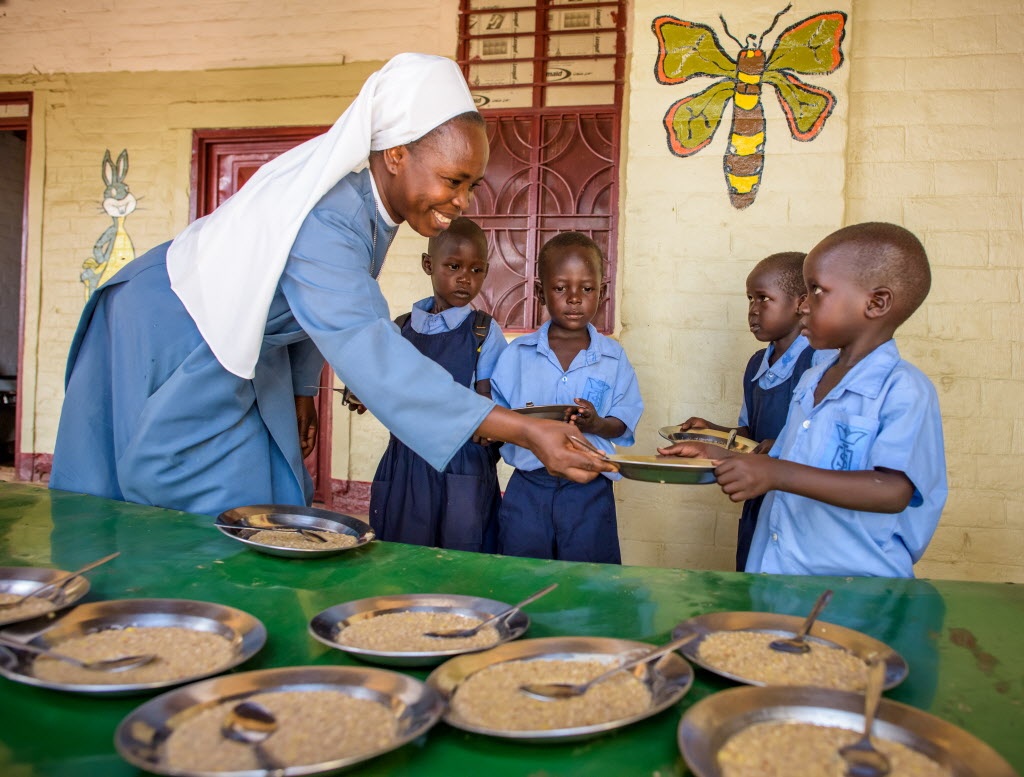
Washington, D.C. (June 12, 2015) — A highly significant conference brought together 130 attendees to discuss Religion and Sustainable Development this week.
The “Religion & Sustainable Development: Building Partnerships to End Extreme Poverty” conference was convened and co-hosted by the World Bank Group, the German Federal Ministry for Economic Cooperation and Development (implemented by GIZ), U.S. Agency for International Development, UK Department For International Development, GHR Foundation, World Vision and the Joint Learning Initiative on Faith and Local Communities, a coalition of faith-based organizations and academic institutions.
Co-sponsors included the Catholic Medical Mission Board, Catholic Relief Services, Islamic Relief USA, Tearfund, American Jewish World Service, IMA World Health and McKinsey & Company.
From July 7-9, the conference attracted a unique combination of policy makers, multilateral and bilateral agencies, religious leaders, development professionals from faith-based organizations and academics.
The goals of the conference were to connect frontline policy makers to the evidence base and expertise to support more effective partnerships with religious and faith-based groups in the common cause of ending extreme poverty and promoting sustainable development.
“The recent Ebola epidemic in Sierra Leone clearly demonstrated the important role that trusted local faith leaders can play in a global health crisis,” said conference participant Christo Greyling, World Vision’s Director of Faith Partnerships for Development. “They saved lives by successfully influencing people to change age-old traditions and practices, such as washing deceased loved ones before burial, that were spreading the virus. This conference proved that policy makers and funders are convinced about the benefits of working with faith communities. Now the question is how to effectively engage them in a strategic, integrated and visible way.”
The conference process focused on reviewing the evidence base and developing specific recommendations for action to strengthen effective partnerships between religious and faith-based groups and the public sector. It sought to obtain leadership commitments to follow-on activities and to establish specific next steps.
In his opening remarks, World Bank President Dr. Jim Kim cited the Catholic social teaching for “a preferential option for the poor.” He said that every religion shared this fundamental commitment to the poorest and most vulnerable and that this provided a common platform with the international development community aim to end extreme poverty.
“We are the first generation in history that can say we can end extreme poverty in our lifetime,” Dr. Kim said. “We can’t get there without all of you,” he added, addressing the faith communities. “We need prophetic voices to inspire us and evidence to lead the way.”
The conference was set up to resource an open and vigorous discussion about the potential and challenges of faith partnerships with the public sector. It started with the launch of The Lancet medical journal’s series on “Faith-based Health Care.”
The issues of religion and sustainable development were debated from the perspectives of public sector leadership and religious and faith-based communities. Sessions also drilled down into the evidence base and key learning in relation to health systems strengthening, Ebola and HIV, sexual- and gender-based violence, humanitarian assistance and disaster relief. The issues of religion and politics were also debated along with approaches to scaling up faith partnerships for development outcomes.
The participants considered these topics through the lens of the conference’s overarching themes: how to frame and communicate the case; how to build on a common foundation; how to overcome complexity in the plurality of faith actors, potentially through the role of intermediary entities; and how to strengthen the evidence.
In his closing remarks, Martin Mauthe-Kaeter, the deputy head of policy division at the German Federal Ministry for Economic Cooperation and Development, said: “It felt like a highly collaborative, jointly owned event. … This has given us a chance to think differently about development – not just about financial and technical issues, but about values.”
Dr. Azza Karam, senior advisor on culture for the United Nations Population Fund, said: “The engagement with faith actors is now the ‘new normal.’ This meeting at the World Bank has given this legitimacy.”
Jean Duff, coordinator of the Joint Learning Initiative on Faith & Local Communities, said: “The conference delivered evidence that shows policy makers how faith-based groups contribute to achieving health and other development goals.”
Matthew Frost, CEO of Tearfund and Co-Chair of the Joint Learning Initiative on Faith and Local Communities, said: “This conference has been a significant staging post in the collaborative process of learning and acting together to achieve more effective partnerships and greater impact in sustainable development.”
John Drew, from McKinsey & Company, said: “The conversation grew over the course of two days culminating in the distillation of a clear way forward around the four strategic themes identified in advance through research.”
– END –
Note to Editors:
- The conference proceedings are available online at http://jliflc.com/conferences/religion-sustainable-development-building-partnerships-to-end-extreme-poverty/. You also can search hashtags #Faith2EndPoverty and #RSD2015 on Twitter to learn more.
- View infographic that shows World Vision’s response to the Ebola epidemic in Sierra Leone: /sites/default/files/World%20Vision%20Sierra%20Leone%20EVD%20Fact%20Sheet.pdf
- Fact Sheet with additional details on World Vision’s Channels of Hope project that brings faith leaders together to combat Ebola available here: /sites/default/files/CoH%20Fact%20Sheet_Final%20Letter%20Size_July%204%202015.pdf
- Online now: The Lancet Series on Faith-based Health Care can be viewed here: http://www.thelancet.com/series/faith-based-health-care.
About World Vision:
World Vision is a Christian humanitarian organization conducting relief, development, and advocacy activities in its work with children, families, and their communities in nearly 100 countries to help them reach their full potential by tackling the causes of poverty and injustice. World Vision serves all people regardless of religion, race, ethnicity, or gender. For more information, please visit www.WorldVision.org/media-center/ or on Twitter @WorldVisionUSA.
Highlights
- Topics included working with the faith community in relation to health systems strengthening, Ebola and HIV, sexual- and gender-based violence, humanitarian assistance and disaster relief.
- Efforts to control Ebola epidemic, reduce stigma a recent example of faith leaders coming together and leading for positive change.